Sheep, Chickens and Bats Help Make Great Wine at Jowler Creek
Jason and Colleen Gerke are a husband and wife team from different backgrounds who came together over Missouri wine. Jason is a 5th generation farmer from Central Missouri who majored in Agriculture Journalism at the University of Missouri-Columbia.
Colleen grew up among the vines in Santa Maria, California and went on to study viticulture and enology at Cal Poly-San Luis Obispo. After their paths intersected, they settled down in Kansas City. While looking for a home and land, they came across a property in Platte City, Missouri. As they came down the drive, Colleen remarked to Jason that it looked like the perfect spot for growing grapes.
That’s exactly what they did, and Jowler Creek Vineyard & Winery was born 30 minutes north of Kansas City.
Like many Midwestern wineries, the Gerke’s built gradually. Starting in 2004 with 250 Norton vines, they added Vignoles the following year. By 2006, the vineyard tripled with the addition of Traminette and Cabernet Franc vines. By 2007, they bottled their first wine; and in 2008, they opened an on-site tasting room which was expanded during 2010. Finally, by 2012, Jason and Colleen were both in a position to become full time vineyard and winery owners.
Throughout the growth of Jowler Creek, sustainable farming practices have been utilized for both the winery and the 3,000 grape vines under cultivation. The winery’s trademarked tagline is ‘Missouri’s First Green Winery.”
Jowler Creek uses sheep to control the growth of grass and weeds. After receiving a grant from the Sustainable Agriculture Research and Education Program, they purchased Olde English Babydoll sheep, an English breed know for hardiness.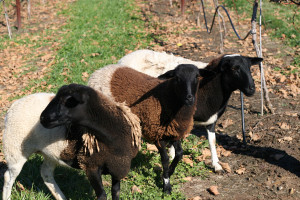
Unbeknownst to the Gerke’s at the time, Olde English Babydoll sheep have to be sheared. After deciding that sheep shearing was not for them, Jason and Colleen found that Dorper sheep worked best for their needs. Dorper sheep are miniature sized, as sheep go, and they are therefore unable to reach the fruit on the vines. Dorper sheep are also easier to maintain because they shed on their own. Currently, there are three sheep that help out in vineyards.
The sheep may not be able to reach the grapes, but the local deer can. Having an electric deer fence is a must to protect the fruit. So solar panels were installed to help power the electric fence. They also installed panels on the building where the tasting room and bottling area are located to reduce the cost of electricity.
For pest control, Jowler Creek utilizes chickens. The roving chickens reportedly reduce the need for spraying pesticides.
Unsure if the chickens were doing their insect eating job, Jason and Colleen decided to conduct an experiment. First, they set up two pheromone box traps. One trap was placed near the chicken house and the other trap was placed on the far side of the vineyard.
In theory, the pheromone box is supposed to attract bugs equally, regardless of where the trap is placed. Jason and Colleen observed a 50% reduction in the number of bugs in the area of the chicken house compared to the vineyard. The chickens now roam the vineyard, along with the sheep, eating ground insects.
Not wanting to waste the chicken’s food production capacity, Jason and Colleen collect and sell the farm fresh eggs in their tasting room. Since the chickens can’t control flying insects, there are two bat houses located in the vineyard as well.
Jason and Colleen also use a variety of tactics to scare away the birds that like to feast on the ripe grapes. With sustainability in mind, they did not want to use plastic netting to cover the vines. Jason has used propane canons for bird control, but the birds quickly became accustomed to the explosions and would soon use the cannons as perches.
The sun reflecting off shiny plates throughout the vineyard is partially effective for bird control, Jason says. Broadcasting recordings of sick birds throughout the vines works as well. But the birds always come back, so Jason rotates these tactics, in addition to using minimal netting when needed.
Jowler Creek Vineyard & Winery offers award-winning wines produced from sustainable farming practices. Their current offerings are:
Norton- Full bodied red with a rich cherry flavor
Chambourcin- Light bodied red with a hint of oak
Vignoles- Semi-sweet white with flavors of apricot, pineapple and honey
Critter Cuvée- Sweet white blend
Butterfly Blush- Rosé with berry fruit flavors
Red Cock-a-Doodle-Do- Sweet red with slightly tart and smoky flavors
Muskrato de Missouri- Locally made version of Moscato d’ Asti
Nort- Port style wine made with Norton grapes
Jowler Creek Vineyard & Winery offers free tastings Wednesdays – Sundays from 11:00 a.m. -5:00 p.m. They also host numerous events throughout the year including wine release parties, food and wine pairings and harvest and grape stomp parties. A popular event is the Sippin’, Smokin’, and Singin’ Saturday Night. This event starts in the Spring and runs through Fall. This is a fun Saturday night with wine, hand rolled cigars and music.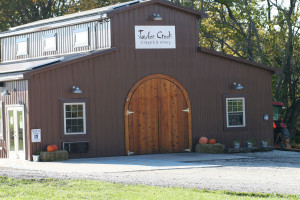
Winery photos by Dale Swiderski
Homepage photo: Dorper sheep at Jowler Creek Vineyard



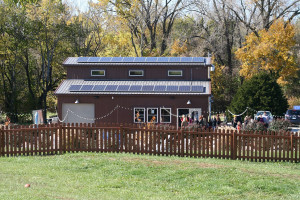
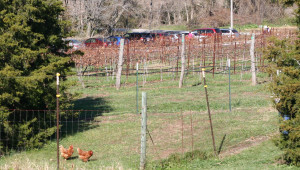
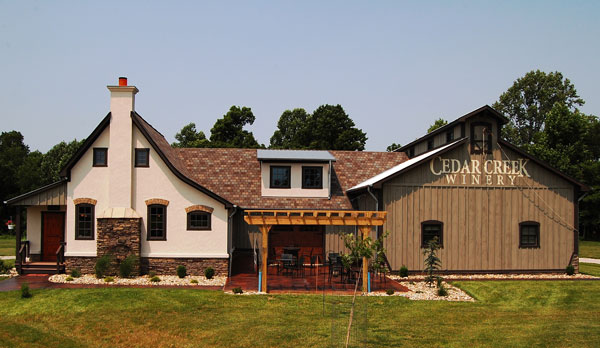

Howdy!,
I live in St. Louis, love MO wines and I’m a project caver in and around the Ozarks. The title of the article piqued my curiosity with the inclusion of bats in it. The article states you have two bat houses but no word if they’re occupied. We are really concerned about white nose syndrome (please google it if you’re not familiar w/ it), and always want the best for the bats. Please let me know if your bat houses have tenants. We’d love to share your story! I cave extensively with members of the Kansas City Area Grotto (KCAG) caving club and one of our favorite things to do after a hard day of caving is to go to wineries! Caving+bats+wineries=a winning combination (IMO!)
Regards,
Shawn Williams
Joint Venturer for the Cave Research Foundation (CRF)